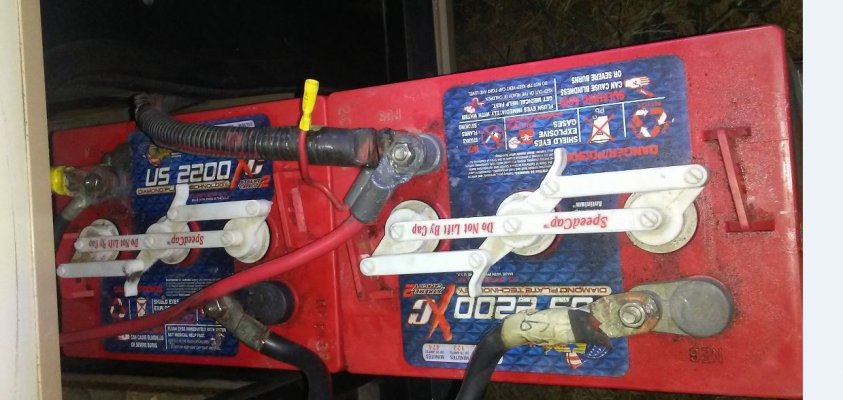We just moved into our RV (1998 Fleetwood Bounder 32') over the weekend. We are living in it full-time and have it parked (very long-term) in a mobile home/RV park. When we bought it we then took it to a major RV dealer to have it checked over for anything major that needed to be fixed before we moved our entire lives (and 4 cats) in. We have noticed a few minor things that they missed, but one thing they did say was that the house batteries needed to be replaced. I bought the batteries and was going to change them in a couple of weeks when I had time to focus on them and in the morning before is got too hot.
Well, after two days in, the house batteries died just after dark. I then went out, got the new batteries, took pictures of the connections on the old batteries and changed them out (it takes 2). When I went to connect the last wires to the terminal, it sparked. I (like the wuss that I am) dropped the cable immediately (and away from any connection). I took a breath and tried again. I got an initial spark, but then nothing and the house lights came on! After a few seconds, I started to hear a hiss come from the engine area. I quickly pulled the connection off and the hiss stopped. I then got some help from our park mangers who know a thing or two about this. They took their time going over my pictures and the connections and so they basically connected it again. No noise this time. Everything's fine. WRONG! A few minutes later we start to smell the chassis battery "burning". I immediately disconnected the house batteries. Then we disconnected the chassis battery which looks like the acid came out on top a little bit (probably the hissing I heard). Reconnected the house batteries. We have power. Now we have TOO MUCH power. After about 30 minutes, we blew a light bulb. This morning when I got up to go to work, I realized that the lights were WAY too bright. I put my hand on the cover and it was very hot to the touch.
Does anyone have any ideas about what could be causing this? I am new to the house battery thing as I have always had a trailer that only had 30 amp power.
Well, after two days in, the house batteries died just after dark. I then went out, got the new batteries, took pictures of the connections on the old batteries and changed them out (it takes 2). When I went to connect the last wires to the terminal, it sparked. I (like the wuss that I am) dropped the cable immediately (and away from any connection). I took a breath and tried again. I got an initial spark, but then nothing and the house lights came on! After a few seconds, I started to hear a hiss come from the engine area. I quickly pulled the connection off and the hiss stopped. I then got some help from our park mangers who know a thing or two about this. They took their time going over my pictures and the connections and so they basically connected it again. No noise this time. Everything's fine. WRONG! A few minutes later we start to smell the chassis battery "burning". I immediately disconnected the house batteries. Then we disconnected the chassis battery which looks like the acid came out on top a little bit (probably the hissing I heard). Reconnected the house batteries. We have power. Now we have TOO MUCH power. After about 30 minutes, we blew a light bulb. This morning when I got up to go to work, I realized that the lights were WAY too bright. I put my hand on the cover and it was very hot to the touch.
Does anyone have any ideas about what could be causing this? I am new to the house battery thing as I have always had a trailer that only had 30 amp power.

